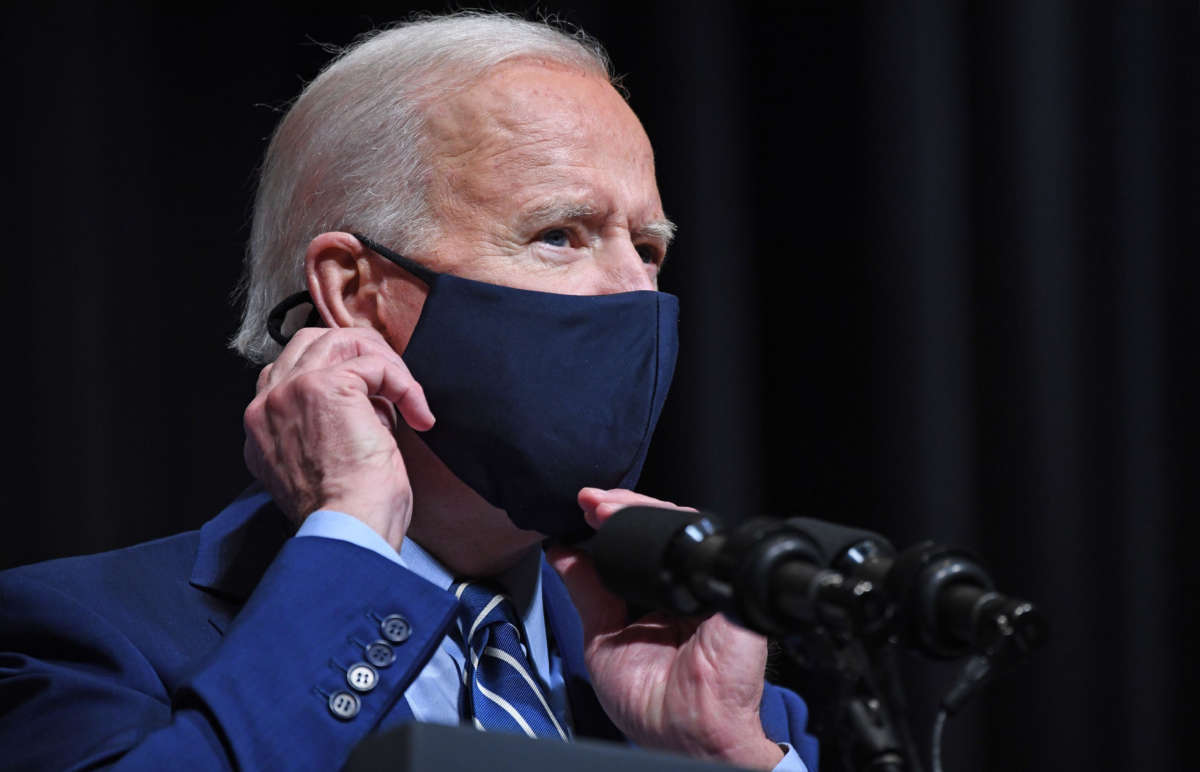In remarks he made on Thursday while visiting the National Institutes of Health, President Joe Biden indicated that Americans may need to wear masks to prevent the spread of coronavirus for the remainder of 2021.
In his statement, Biden mentioned how he continued to wear his mask even though he was 10 feet away from health officials. He did so, he said, because he felt it was “critically important” for Americans to see him wearing a mask in public settings.
“You know that wearing this mask through the next year here can save lives — a significant number of lives,” Biden added.
The president emphasized the importance of wearing masks later on in his speech, due to new variants of COVID-19 being found in recent months.
“The new strains emerging create immense challenges, and masking is still the easiest thing to do to save lives. But we need everyone to mask up,” he said.
Modeling from the Institute for Health Metrics and Evaluation (IHME) at the University of Washington seems to back up Biden’s assertions about masks and COVID-19.
According to IHME’s numbers, between now and June 1, the U.S. death toll from coronavirus is expected to reach 702,663 individuals. If every American wore their mask while in public, however, IHME predicts a significantly smaller death toll, with the U.S. reaching 586,998 deaths during the next four months instead.
As of Friday, 475,224 Americans have died from COVID-19 since the start of the pandemic. If the modeling from IHME is correct, universal mask-wearing could cut in half the total number of deaths predicted between now and June 1, compared with projections based on the current rate of mask-wearing.
Biden’s approach to coronavirus, specifically when it comes to wearing masks, is considerably different from that of his predecessor, former President Donald Trump.
Biden emphasized wearing masks during much of the 2020 presidential campaign, where, in his public appearances, he was seen wearing one with very limited exceptions. Trump, by contrast, did not wear masks in a number of public appearances, and held several campaign rallies where masks were seldom seen.
Trump’s aversion to masks was well-documented, and many have criticized him for having turned the issue into a political one. In one interview early on in the pandemic, the former president even said he believed others who did wear masks were doing so to show their disapproval for him.
Trump even mocked Biden during their first presidential debate last fall over the issue.
“I don’t wear masks like him — every time you see him, he’s got a mask,” Trump said, referring to Biden. “He could be speaking 200 feet away from me, and he shows up with the biggest mask I’ve ever seen.”
There has also been a slight change in public opinion on mask-wearing among U.S. residents since Biden was elected president.
An Economist/YouGov poll from late October/early November found that 59 percent of Americans said they wore their masks “always” when they were out in public. A similar poll in February found that number had risen to 62 percent.
The most noticeable changes in opinion were among Trump voters and Republican respondents. Among those who voted for Trump, just 37 percent said they “always” wore masks in public before the election took place. In this month’s poll, however, that number is up by 9 points, with 46 percent saying they now “always” wear a mask in public.
The polling data also saw a marked increase in how many Republican respondents “always” wear masks in public. In November, just 37 percent of GOP-aligned voters said they wore masks whenever they were in public. In February, that number is up to 49 percent. (Republicans and Trump voters are, of course, overlapping groups.)
Democratic respondents in the poll, meanwhile, didn’t show much of a change: In both months, 79 percent said they “always” wore a mask in public.
We have 9 days to raise $50,000 — we’re counting on your support!
For those who care about justice, liberation and even the very survival of our species, we must remember our power to take action.
We won’t pretend it’s the only thing you can or should do, but one small step is to pitch in to support Truthout — as one of the last remaining truly independent, nonprofit, reader-funded news platforms, your gift will help keep the facts flowing freely.
